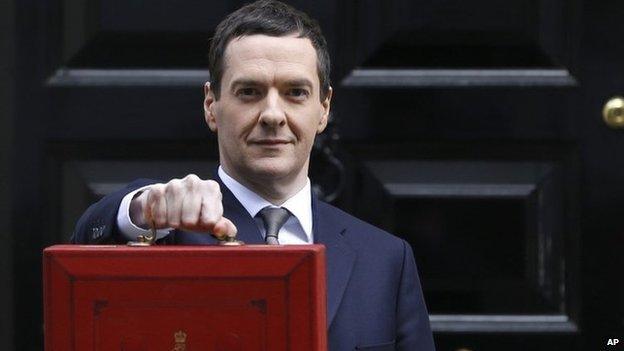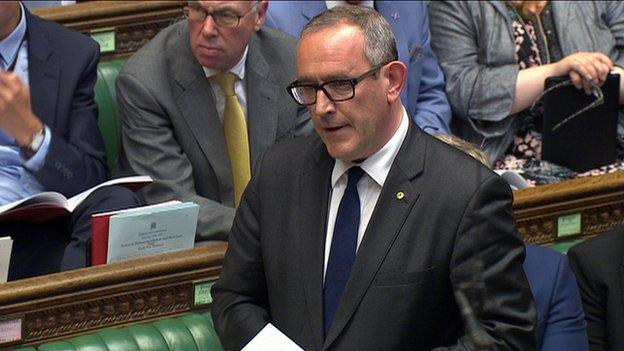Budget 2015: SNP says Osborne 'taking from the poor'
- Published
This is the first Conservative-only Budget since 1996
George Osborne has been accused of being the "high priest of an austerity cult" after he set out plans to cut the welfare budget by £12bn.
The Chancellor told MPs that the first Conservative-only Budget for 18 years would help working people.
It included plans for a new "national living wage" alongside a series of reductions in welfare spending and some tax increases.
The SNP said Mr Osborne was "taking from the poor, giving to the rich".
Scottish Labour said it was a "bad budget for working families, our most vulnerable and our young people".
But the Chancellor said his Budget was designed to take Britain "from a low wage, high tax, high welfare economy, to the higher wage, lower tax, lower welfare country we intend to create".
He pointed to the Greek crisis as evidence that a "bold new settlement" is needed, saying Britain was still "borrowing too much and spending too much".
However, he pledged to make the £12bn of cuts to the welfare budget over three years rather than two.
Benefits cap
The chancellor announced a new compulsory national living wage for workers aged over 25 which will start at £7.20 in April 2016 and then rise to £9 an hour by 2020. It will replace the minimum wage which is currently £6.50, but its starting rate will be lower than that recommended by the Living Wage Foundation.
The government said about 140,000 workers in Scotland would benefit, with full-time workers on the new wage expecting to increase their earnings by about £5,200 more by 2020.
The Scottish Conservatives said the £9 national living wage by 2020 went further than the £8.70 figure recommended by the SNP.
Mr Osborne also said that the benefits cap will be cut from the present £26,000 that a family can claim in a year to £20,000 for those living outside London - a move which he said would save more than £1.5bn.
And he confirmed changes to tax credits, limiting them to two children for new claimants from 2017. The income threshold for tax credits is to be reduced from £6,420 to £3,850.
Among the other measures announced by the chancellor were:
All benefits for working-age people, except maternity and disability payments, to be frozen for four years
An increase in the personal income tax allowance to £11,000 from April 2016, rising to £12,500 by 2020
The salary threshold for the 40p income tax rate will rise to £43,000 a year from April 2016
Employment and Support Allowance for those deemed able to find work will be reduced to come into line with Job Seekers Allowance for new claimants
Young people aged 18-21 will no longer be able to claim housing benefit
An increase in the inheritance tax threshold to £1m for married couples by 2017
A commitment to meeting the Nato target of spending 2% of national income on defence for the next five years
New cars and motorbikes will not need MOTs for the first four years, rather than three.

Mr Osborne said the changes announced would save £9bn on the welfare budget by 2020.
The SNP welcomed the principle of a national living wage, but said Mr Osborne had set it too low and claimed the rise would be offset by cuts in tax credits.
The party's Treasury spokesman at Westminster, Stewart Hosie, said the Budget had been "less a plan to boost productivity, which should have been at the heart of this, and more a sermon from the high priest of an austerity cult".
He added: "It was not the budget the country needed and it was not the budget needed by those who have suffered the most over the last five years.
"Although the chancellor was right in one regard, it was a Conservative budget - taking from the poor, giving to the rich. The Tories have done it again."

Stewart Hosie, the SNP's Treasury spokesman, said the Conservatives were "taking from the poor to give to the rich"
The Scottish Trades Union Congress (STUC) claimed the national living wage will be "nothing of the kind and is simply a cheap gimmick aimed at undermining the successful work we have undertaken to promote a meaningful living wage that genuinely helps people out of in work poverty".
Shelter Scotland described the move to stop 18 to 21-year-olds claiming housing benefit as "shameful, unjustified and cruel".
Director Graeme Brown said: "This completely removes the safety net that is in place to protect young people whose circumstances often prevent them from staying in or returning to the family home."
Low paid
Tax credits provided £2bn in additional cash to households in Scotland in 2013-14, with two-thirds going to help families in low-paid work with children.
Mr Osborne has previously said tax credits had become a "very expensive" system, costing £30bn.
He said the low paid would be compensated by tax cuts in an effort to end the "merry-go-round on which people pay their taxes and then get back benefits" and firms would be encouraged to pay higher wages.
However Jackie Brock, chief executive of the organisation Children in Scotland, called moves to cut child tax credits "shameful", saying they would "punish children born into larger low income families".
Ian Murray, Labour's shadow secretary of state for Scotland, said the chancellor had "cut vital support for working families, whilst slashing reducing inheritance tax for the most well off".
And he urged the SNP to make clear how they would use the new tax and welfare powers being devolved to Holyrood as part of the Scotland Bill to "make a real difference to working families in Scotland."
Liberal Democrat MP Alistair Carmichael described the budget as "an assault on the young and the poor".
The former Scottish secretary added: "If anyone had doubts, the budget today shows that the nasty party is well and truly back."